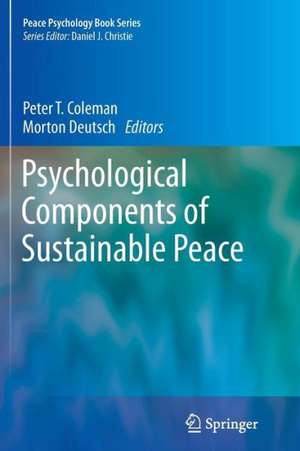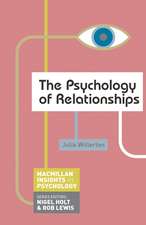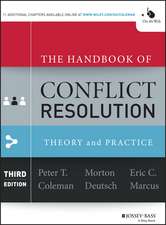Psychological Components of Sustainable Peace: Peace Psychology Book Series
Editat de Peter T. Coleman Morton Deutschen Limba Engleză Paperback – 17 iul 2014
| Toate formatele și edițiile | Preț | Express |
|---|---|---|
| Paperback (1) | 1044.84 lei 38-44 zile | |
| Springer – 17 iul 2014 | 1044.84 lei 38-44 zile | |
| Hardback (1) | 1227.84 lei 43-57 zile | |
| Springer – 16 iun 2012 | 1227.84 lei 43-57 zile |
Din seria Peace Psychology Book Series
- 18%
 Preț: 779.26 lei
Preț: 779.26 lei -
 Preț: 361.05 lei
Preț: 361.05 lei - 15%
 Preț: 639.25 lei
Preț: 639.25 lei - 18%
 Preț: 788.54 lei
Preț: 788.54 lei - 15%
 Preț: 699.28 lei
Preț: 699.28 lei - 15%
 Preț: 646.62 lei
Preț: 646.62 lei - 18%
 Preț: 1690.13 lei
Preț: 1690.13 lei - 15%
 Preț: 645.28 lei
Preț: 645.28 lei - 18%
 Preț: 945.14 lei
Preț: 945.14 lei - 15%
 Preț: 649.54 lei
Preț: 649.54 lei -
 Preț: 386.39 lei
Preț: 386.39 lei - 15%
 Preț: 697.82 lei
Preț: 697.82 lei - 15%
 Preț: 591.14 lei
Preț: 591.14 lei - 18%
 Preț: 1222.94 lei
Preț: 1222.94 lei - 15%
 Preț: 644.82 lei
Preț: 644.82 lei - 15%
 Preț: 649.22 lei
Preț: 649.22 lei - 15%
 Preț: 697.65 lei
Preț: 697.65 lei -
 Preț: 388.72 lei
Preț: 388.72 lei - 15%
 Preț: 647.08 lei
Preț: 647.08 lei - 24%
 Preț: 967.02 lei
Preț: 967.02 lei - 15%
 Preț: 638.89 lei
Preț: 638.89 lei - 15%
 Preț: 650.37 lei
Preț: 650.37 lei - 18%
 Preț: 733.15 lei
Preț: 733.15 lei -
 Preț: 398.74 lei
Preț: 398.74 lei - 15%
 Preț: 644.30 lei
Preț: 644.30 lei - 18%
 Preț: 1116.57 lei
Preț: 1116.57 lei -
 Preț: 365.05 lei
Preț: 365.05 lei - 15%
 Preț: 643.99 lei
Preț: 643.99 lei - 18%
 Preț: 1116.26 lei
Preț: 1116.26 lei - 18%
 Preț: 1381.26 lei
Preț: 1381.26 lei - 18%
 Preț: 1595.75 lei
Preț: 1595.75 lei - 18%
 Preț: 779.89 lei
Preț: 779.89 lei
Preț: 1044.84 lei
Preț vechi: 1374.80 lei
-24% Nou
Puncte Express: 1567
Preț estimativ în valută:
199.93€ • 209.27$ • 166.41£
199.93€ • 209.27$ • 166.41£
Carte tipărită la comandă
Livrare economică 26 martie-01 aprilie
Preluare comenzi: 021 569.72.76
Specificații
ISBN-13: 9781489991287
ISBN-10: 148999128X
Pagini: 400
Ilustrații: XVIII, 382 p.
Dimensiuni: 155 x 235 x 21 mm
Greutate: 0.56 kg
Ediția:2012
Editura: Springer
Colecția Springer
Seria Peace Psychology Book Series
Locul publicării:New York, NY, United States
ISBN-10: 148999128X
Pagini: 400
Ilustrații: XVIII, 382 p.
Dimensiuni: 155 x 235 x 21 mm
Greutate: 0.56 kg
Ediția:2012
Editura: Springer
Colecția Springer
Seria Peace Psychology Book Series
Locul publicării:New York, NY, United States
Public țintă
ResearchCuprins
Introduction.- Effective Cooperation, the Foundation of Sustainable Peace.- Constructive Conflict Resolution and Sustainable Peace.- Creative Problem Solving: Not Just About the Problem.- Transforming Communication for Peace.- LIF PLUS: the life-improving force of peaceful language use.- The Role of Equality in Negotiation and Sustainable Peace.- Sustaining Peace through Psychologically Informed Policies: The Geohistorical Context of Malaysia.- Justice, Activity, and Narrative: Studying of the World March for Peace and Nonviolence.- Gender and Sustainable Peace.- The Psychodynamics of Peace.- Culture of Peace.- Reconciliation between Groups, the Prevention of Violence, and Lasting Peace.- Sustainable Peace: A Dynamical Systems Perspective.- Fostering Global Citizenship.- A Framework for Thinking about a Global Community.- Education for Sustainable Peace: Practices, Problems and Possibilities.- The Essence of Peace: Towards a Comprehensive and Parsimonious Model of Sustainable Peace.
Recenzii
From the reviews:
“Psychological Components of Sustainable Peace … provides empirical support for optimism and valuable suggestions as to how to translate optimism into a less violent world. Although it is likely to be of particular interest to peace psychologists and their graduate students, its emphasis on multidisciplinary collaboration and its contributions from experts in areas such as conflict resolution, anthropology, sociology, and linguistics will make it a valuable source for scholars from other social sciences.” (Kathleen Malley-Morrison, PsycCRITIQUES, Vol. 58 (13), March, 2013)
“Psychological Components of Sustainable Peace … provides empirical support for optimism and valuable suggestions as to how to translate optimism into a less violent world. Although it is likely to be of particular interest to peace psychologists and their graduate students, its emphasis on multidisciplinary collaboration and its contributions from experts in areas such as conflict resolution, anthropology, sociology, and linguistics will make it a valuable source for scholars from other social sciences.” (Kathleen Malley-Morrison, PsycCRITIQUES, Vol. 58 (13), March, 2013)
Textul de pe ultima copertă
Scholarship on the psychology of peace has been accumulating for decades. The approach employed has been predominantly centered on addressing and preventing conflict and violence and less on the conditions associated with promoting peace. Concerns around nuclear annihilation, enemy images, discrimination, denial of basic human needs, terrorism and torture have been the focal points of most research. The Psychological Components of a Sustainable Peace moves beyond a prevention-orientation to the study of the conditions for increasing the probabilities for sustainable, cooperative peace. Such a view combines preventative scholarship with a promotive-orientation to the study of peaceful situations and societies.
The contributors to this volume examine the components of various psychological theories that contribute to the promotion of a harmonious, sustainable peace. Underlying this orientation is the belief that promoting the ideas and actions which can lead to a sustainable, harmonious peace will not only contribute to the prevention of war, but will also lead to more positive, constructive relations among people and nations and to a more sustainable planet.
The Psychological Components of a Sustainable Peace is valuable and stimulating reading for researchers in peace psychology, political psychology, and conflict resolution as well as others who are interested in developing a sustainable, harmonious world.
The contributors to this volume examine the components of various psychological theories that contribute to the promotion of a harmonious, sustainable peace. Underlying this orientation is the belief that promoting the ideas and actions which can lead to a sustainable, harmonious peace will not only contribute to the prevention of war, but will also lead to more positive, constructive relations among people and nations and to a more sustainable planet.
The Psychological Components of a Sustainable Peace is valuable and stimulating reading for researchers in peace psychology, political psychology, and conflict resolution as well as others who are interested in developing a sustainable, harmonious world.
Caracteristici
Re-orients study of peace from preventative to promotative Emphasizes the importance of understanding sustainability in peace, which is a new & developing concept in the field Provides a multidisciplinary field an up-to-date overview of the basic psychological components of peace Includes supplementary material: sn.pub/extras
Descriere
Descriere de la o altă ediție sau format:
Scholarship on the psychology of peace has been accumulating for decades. The approach employed has been predominantly centered on addressing and preventing conflict and violence and less on the conditions associated with promoting peace. Concerns around nuclear annihilation, enemy images, discrimination, denial of basic human needs, terrorism and torture have been the focal points of most research. The Psychological Components of a Sustainable Peace moves beyond a prevention-orientation to the study of the conditions for increasing the probabilities for sustainable, cooperative peace. Such a view combines preventative scholarship with a promotive-orientation to the study of peaceful situations and societies. The contributors to this volume examine the components of various psychological theories that contribute to the promotion of a harmonious, sustainable peace.
Scholarship on the psychology of peace has been accumulating for decades. The approach employed has been predominantly centered on addressing and preventing conflict and violence and less on the conditions associated with promoting peace. Concerns around nuclear annihilation, enemy images, discrimination, denial of basic human needs, terrorism and torture have been the focal points of most research. The Psychological Components of a Sustainable Peace moves beyond a prevention-orientation to the study of the conditions for increasing the probabilities for sustainable, cooperative peace. Such a view combines preventative scholarship with a promotive-orientation to the study of peaceful situations and societies. The contributors to this volume examine the components of various psychological theories that contribute to the promotion of a harmonious, sustainable peace.









